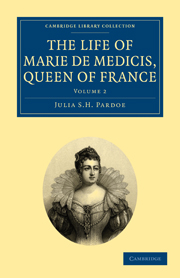Summary
The Prince de Condé and the Count de Soissons having withdrawn from the capital, MM. de Guise and d'Epernon found themselves once more the principal personages of the court; but their triumph was nevertheless greatly moderated by the jealousy of Concini, who began to apprehend that their ceaseless efforts to gratify the wishes of the Queen, and to flatter her love of splendour and dissipation, might ultimately tend to weaken his own influence; while the ministers, on their side, aware that the negociations then pending with Spain for the marriage of the King could not be readily concluded without their aid and concurrence, however they might deprecate their return from other causes, also felt the necessity of securing their co-operation; for which purpose it was essential that such measures should be adopted as might render this concession acceptable to the royal malcontents.
While this subject was under consideration, and Lent rapidly approaching, the Queen, who being still in slight mourning, could not, according to the established etiquette, hold any assemblies in her own apartments, but who was unwilling to forego the customary amusements of the carnival, desired the Duke de Guise, the Prince de Joinville, and M. de Bassompierre to perform a ballet every Sunday, which they accordingly did; “dividing,” says the latter, “the expense between us.”
- Type
- Chapter
- Information
- The Life of Marie de Medicis, Queen of France , pp. 237 - 288Publisher: Cambridge University PressPrint publication year: 2010First published in: 1852

